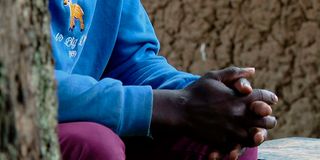She called me half a man, turning my dream marriage to a daily horror

A young man who was sexually abused by the aunt during an interview in Bungoma County on November 28, 2024. At 14, his sanctuary became a prison with his aunt molesting him every night.
What you need to know:
- Three men break their silence about GBV, challenging societal norms that often dismiss male survivors.
- Jared endured years of emotional abuse from his educated wife who turned their modest marriage into a prison of humiliation, while Rodgers shares his harrowing story of sexual abuse by his aunt that began when he was just 14 years old.
- John's experience reveals how a toxic relationship led to public shaming on social media, forcing him to abandon his education and community.
In a tiny rental room in Bungoma, Jared* would count the day's earnings with his wife, their laughter mixing with the rustle of worn banknotes. His calloused hands, bearing testament to hours of manual labour, would carefully set aside Sh150 shillings for tomorrow's meals. She would teach him about saving, her university education complementing his street-smart wisdom. Their love transcended their different backgrounds – he, a Class Eight dropout, and she, a university graduate.
"She'd laugh at my silly jokes, help me count the little money I brought home, and even taught me how to save," Jared recalls, his eyes distant as he remembers happier times.
But that tenderness would eventually transform into torment, their modest dreams crumbling under the weight of emotional abuse and manipulation. Jared's story challenges our society's deeply entrenched perceptions about gender-based violence (GBV), forcing us to confront an uncomfortable truth: men, too, can be victims.
For years, the narrative surrounding GBV has focused primarily on women survivors. Yet beneath this widely acknowledged crisis lies another layer of suffering – one often dismissed with cruel jokes or met with disbelief. Men who experience abuse face a double burden: the pain of the violence itself and the stigma of speaking out in a society that expects them to be invulnerable.
The Gender Desk set out to uncover these hidden stories, speaking with men who have endured abuse at the hands of those they once trusted most. Their testimonies reveal the complex web of emotional, physical, and psychological violence that knows no gender bounds.
Jared's story begins in 2002, when a chance encounter led to what seemed like destiny. Despite their educational differences, he and his future wife formed an immediate connection. After a year of dating, they married in 2003, sharing modest dreams and a tiny rental room. His work as a casual labourer sustained them, and their early days were marked by mutual respect and partnership.
The arrival of their first child a year later, followed by a second the next year, only seemed to strengthen their bond. But four years into their marriage, everything changed when his wife secured a position at a prestigious non-governmental organisation.
"I was happy for her. She had worked hard for it," Jared says, his voice carrying no hint of bitterness about her success.
However, the power dynamics in their relationship shifted dramatically. The woman who once appreciated his hard work began to view him through a lens of contempt. Their home, once filled with warmth, became a battleground of psychological warfare.
"She started saying things like, 'What do you know? You're just a dropout,'" Jared recounts, the pain still evident in his voice.
The abuse manifested in countless ways. She would withhold food, return the money he struggled to provide, and unleash cutting remarks about his worth. The bedroom became another arena for humiliation, where she would mock his masculinity and deny him intimacy.
"In the bedroom, I became a slave," he shares. "She told me she could easily find another man who could give her what I couldn't. She would say, 'You're not satisfying me. You're not man enough. You're only half a man, and by the way, those two children aren't even yours.'"
The cruelty extended beyond their private spaces. Her family joined in the belittlement, with her brothers taking his belongings and taunting him about his inability to provide lavish gifts. Family meetings meant to resolve conflicts instead became tribunals where Jared stood accused of inadequacy.

Jared*, who endured years of emotional abuse from his educated wife who turned their modest marriage into a prison of humiliation, in this photo taken on November 28, 2024, in Bungoma.
As the abuse intensified, Jared found himself turning to alcohol for solace. "I never used to drink because I did not have the money to spare," he admits. "But when she started rejecting my money after all the efforts and the humiliation I was going through, I got solace in alcohol."
By 2014, the situation had deteriorated further. Meals became another form of punishment, with his wife either throwing food away or serving him "as if I were her enemy." The presence of her brothers added another layer of threat: "If you dare raise your hands on her, then the brothers land on you."
For three more years, Jared endured, clinging to the hope that things would improve. "I thought I could fix it," he says. "I kept telling myself that things would get better."
Finding freedom in flight
In 2017, after another devastating argument, Jared finally reached his breaking point. With just a small bag of belongings, he walked away from the home they had built and the dreams they once shared.
"When I left my house, a friend housed me. I was using a box as my bed, but I did this because I needed my peace of mind," he explains. "I realised I was dying inside; I had nothing left to give."
Today, Jared continues to struggle with the aftermath of his abuse. While his ex-wife has remarried, leaving their two daughters behind, he remains single, haunted by fears of future relationships.
"I feel like I'm not man enough," he confesses. "What if another woman notices it too and destroys me like she did?"
Stories like Jared's echo across Kenya, though they often remain untold. As the 16 Days of Activism against Gender-Based Violence came to a close yesterday, countless men continue to suffer in silence, trapped in relationships where emotional, physical, and psychological abuse have become their daily reality. Society's expectations of masculine strength and stoicism create invisible barriers that discourage these survivors from seeking help, leaving them to grapple alone with feelings of shame, emasculation, and isolation.
Physical violence
The academic world has largely overlooked these experiences. While research abounds on intimate partner violence, it typically casts men as perpetrators and women as victims, rarely examining the complex dynamics when these roles are reversed. A recent sociological study in South Africa, however, has begun to shed light on this hidden dimension of abuse, revealing how men navigate the challenging territory between traditional masculinity and their experiences as survivors.
The study found that men who faced control, intimidation, or physical violence from their female partners often chose paths of resilience that challenged conventional notions of masculine response. Rather than retaliating, many emphasised self-control and emotional strength, viewing calm restraint as a more honourable expression of their masculinity. These choices reflect a profound renegotiation of what it means to be a man in the face of abuse.
In Kenya, the numbers paint a stark picture of this hidden crisis. According to the Kenya Demographic Health Survey, nearly half of men aged 15-49 have experienced physical violence since age 15, with 12 percent reporting incidents within the past year alone. The survey reveals that 45 percent of men in this age group have faced either physical or sexual violence, with 40 percent experiencing physical violence only, two percent enduring sexual violence only, and four percent suffering both.
The impact of this violence leaves deep scars. Among male survivors of spousal violence, nearly a quarter report physical injuries, yet only 27 percent have sought help to escape their situation. Men between 25 and 40 years old are particularly vulnerable to sexual violence, while certain demographic patterns emerge across the country. Those living in rural areas face higher rates of physical violence than their urban counterparts – 47 percent compared to 39 percent. The Western region reports the highest incidence at 61 percent, while the North Eastern region shows the lowest at 32 percent.
Faith and family size also play roles in this complex landscape. Roman Catholic or Protestant men, those with large families of five or more children, and formerly married men, report higher rates of physical violence. Conversely, men with no formal education and those in the highest wealth quintile appear somewhat more protected, reporting lower rates of violence than their peers.
These statistics exist within a broader context of gender-based violence that affects all Kenyans. A recent survey by the International Centre for Reproductive Health-Kenya examined the prevalence of abuse across four counties, revealing that one in four women reported experiencing physical, sexual, or emotional abuse from their partners. The numbers vary significantly by region – in Kakamega, half of the 799 women surveyed reported sexual abuse, while Bungoma and West Pokot showed similarly troubling rates at 47 and 43 percent respectively. Kiambu reported a lower but still concerning rate of 25 percent among 803 women.
Sexual harassment
Prof Peter Gichangi, who led the study, acknowledges its current limitations. "We looked at GBV in women because of the financial constraints," he explains, "but I know that there are also men experiencing GBV. When funds allow, we will look at the numbers in men."
The Kenyan government has not remained idle in the face of these challenges. Recent years have seen significant strides in addressing GBV, including the ratification of ILO Convention 190 to enhance workplace safety and address sexual harassment. The establishment of the National Gender and Equality Commission has brought with it a robust GBV Information Management System, while the Male Engagement Forum promotes more inclusive approaches to combating GBV. Plans are underway to establish GBV Recovery Centres and shelters across all 47 counties, and the National Police Service continues to scale up its integrated response to GBV through the Policare initiative.
Yet, despite these measures, many men like Jared continue to suffer in silence. For him, healing remains a daily journey.
Among the tranquil hills of Bungoma County's Samoya village, another story of survival unfolds. Here, perched on the edge of a wooden stool where he now earns his living as a shamba boy, 30-year-old Rodgers* shares a story he has kept buried for half his life. His gaze is distant, his voice measured as he unravels memories of a childhood stolen.
In 2009, at just 14 years old, Rodgers's world crumbled with the sudden death of both his parents. With few options available, he moved into his grandmother's home – a place that should have been a sanctuary but instead became the setting for years of abuse.
"When my parents died, I moved to stay with my grandmother," Rodgers recalls. "This was the only place I could stay given that no one wanted to take me in." Two years later, his aunt – his father's sister – joined the household. Though they shared the kitchen as their sleeping quarters, with separate beds, what followed would forever alter the course of his young life.
The abuse began subtly but escalated one night when his 25-year-old aunt crossed the invisible boundary between their beds. That night marked the beginning of a two-year nightmare, where every evening, an unwitting 14-year-old boy was forced to play the role of a boyfriend.

30-year-old Rodgers* shares a story he has kept buried for half his life. In 2009, at just 14 years old, his world crumbled with the sudden death of both his parents.
"She even taught me how to have sex, something that had never crossed my mind," Rodgers says, his voice barely above a whisper. "Any time I told her I would not want to, she would beat me up and even falsely accuse me of stealing, and my grandmother would beat me up."
The pattern of abuse was relentless. His only respite came on nights when his aunt was away from home. Otherwise, the demands were constant, backed by threats and manipulation. "What pains me is that in 2009 when I did not know what to do, she taught me, and in 2010 when I joined Class Eight, I knew how to penetrate a woman, I knew what sex was," he shares, the weight of lost innocence heavy in his words.
When Rodgers tried to seek help, the systems meant to protect him failed spectacularly. His attempts to confide in his grandmother were met with accusations of lying and threats to keep silent. In what appears to have been a pre-emptive strike against any future revelations, his grandmother and aunt even reported him to the local chief for being "undisciplined."
"This was a cover-up so that when I decided to speak, no one would believe me," Rodgers explains. "I felt betrayed by the people I trusted, and that's how I stopped talking and continued doing as instructed."
In rural communities like Samoya village, discussions about sexual abuse – particularly involving male victims – remain taboo. Cultural norms that demand masculine strength and resilience create an impenetrable silence around such violations, leaving survivors like Rodgers to cope alone with their trauma.
At 16, after completing his primary school exams, Rodgers reached his breaking point. One night, with nothing but a school bag containing a few belongings, he walked away from the nightmare. "I didn't even say goodbye," he recalls. "I just left."
But escape proved complicated. After finding work as a herds boy in Kisumu, financial hardship forced him to return home a year later – where his aunt resumed the abuse. This cycle of flight and return continued until he finally secured work in Meru County, putting physical distance between himself and his abuser.
Now, 16 years after the abuse began, its impact continues to shape Rodgers's life. He avoids his grandmother's house, appearing only for funerals where he carefully maintains his distance from his aunt. The trauma has left deep scars on his view of relationships and intimacy.
"I always think that women will always torment men," he admits, his shy demeanour betraying years of unprocessed pain. "I fear that should I fail to perform in bed, it will always come back to me the way my aunt would beat and insult me."
Rodgers has never married, and until now, has never shared his story.
The weight of silence bears heavily across Kenya's rural communities, where countless men and boys endure abuse behind closed doors, their stories buried beneath layers of shame and cultural stigma. Research consistently shows that cases of male sexual abuse are vastly underreported, particularly in areas where traditional gender roles maintain their iron grip on society. Without adequate support systems, survivors often face their trauma in isolation, their pain echoing in empty spaces where help should be.
In Okanya Village, on the outskirts of bustling Bungoma town, we meet John*, whose story reveals yet another face of relationship abuse. Hunched over as he speaks, his eyes clouded with memories, John shares a tale of love that transformed into betrayal, and of a society quick to judge and slow to understand.

After rejecting his girlfriend's excessive demands, John* faced public humiliation and threats that forced him to abandon college and flee his hometown. He spoke to Nation.Africa in Bungoma on November 28, 2024.
His story begins at Kisiwa Technical Institute in 2011, where he fell in love with a classmate. The first two months unfolded like a dream, but as their relationship deepened and they began visiting each other, the dynamic shifted dramatically. His girlfriend's bold, outspoken personality manifested in increasingly demanding expectations, both emotional and physical. For John, who had limited experience with intimacy, these demands became overwhelming.
"She wanted us to be together every night," he recalls, his voice tightening with the memory. "But I couldn't keep up. I didn't even know how to express that without feeling less of a man." The pressure mounted, and John's insecurities deepened. He found himself retreating, making excuses to avoid dates, struggling to find words that wouldn't hurt her.
When John finally stood his ground against her demands, the aftermath was devastating. Their breakup unleashed a torrent of public humiliation that would alter the course of his life.
"She wrote in the school WhatsApp group and even on social media platforms that I wasn't interested in women and that I was pretending to be straight yet I was gay," John says.
The accusations spread like wildfire through their social circles. Within days, whispers turned to open ridicule. Students sneered in hallways, and even community members caught wind of the rumours.
"People would point at me and laugh," he remembers, his hands trembling as he speaks. "Some even called me names. Others, including some of my community members, traced where I stayed and wanted to beat me up."
The weight of collective judgment became unbearable. Unable to face the daily scrutiny, John made the painful decision to leave university altogether, moving to a distant town and severing all ties with his past.
"The humiliation was too much," he says, his voice breaking. "I couldn't even walk around campus without feeling everyone's eyes on me. Love is supposed to lift you up, but for me, it became the thing that tore me down."
Thirteen years later, John is slowly piecing his life back together. He has returned to school to pursue a diploma in social work, though the emotional scars remain fresh. "This affected me; I have never dared to start a relationship," he admits. "I don't think I have the strength to date now. It will happen at the right time, but I am not ready yet."
His experience illuminates the devastating power of social media as a tool for public shaming, transforming private relationship struggles into public spectacles that can destroy lives. What began as a personal boundary issue escalated into a campaign of humiliation that forced him to abandon his education and community.
Legal frameworks
The stories of Jared, Rodgers, and John paint a complex portrait of male vulnerability in modern Kenya. From domestic abuse to sexual exploitation to public humiliation, their experiences challenge our understanding of GBV. Each narrative reveals how traditional expectations of masculinity often trap men in silence, forcing them to bear their pain alone rather than risk the judgment of a society that struggles to see them as victims.
As Kenya continues to grapple with GBV, these voices remind us that healing requires more than just legal frameworks and support services. It demands a fundamental shift in how we understand and discuss abuse, creating space for all survivors to speak their truth without fear of judgment or dismissal. Only then can we begin to address the full spectrum of GBV, ensuring that no survivor – regardless of gender – has to walk the path to healing alone.
For Jared, Rodgers, and John, sharing their stories marks a crucial step toward breaking the silence that has bound them for so long. While their journeys to healing continue, their courage in speaking out lights the way for others still trapped in the shadows of abuse.
*Names have been changed to protect the survivors' identities.


